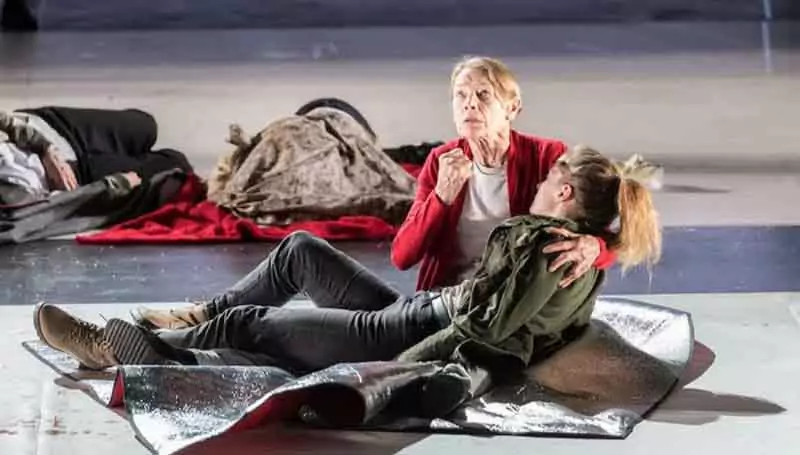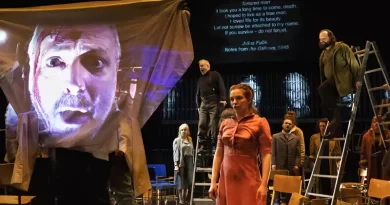“King Lear” at Old Vic and Barbican
John Russell Taylor on the South Bank and in City of London
7 November 2016
Breeches role or Queen Lear? Speculation was rife before the opening of Glenda Jackson’s King Lear at The Old Vic. Sarah Bernhardt played Hamlet as a man, Helen Mirren played Prospero as a woman. So what would Jackson’s approach be? Well, the answer is: certainly not Queen Lear but otherwise, in a production as abstract as this, it is difficult to say for sure. Or, let us rather say, the question does not really arise.
Deborah Warner’s production is acted out among movable, illuminated panels which remain largely plain except for the storm sequence when there are sundry projections and other scenic effects, including a lot of play with a huge plastic sheet reminiscent of that representing a stormy sea in Fellini’s Casanova. Visually, it all takes place in no particular place and that no particular time with the costumes being vaguely contemporary. So we more or less have to take it for what it is and ask no questions.
It is maybe some sort of clue that this is the first Lear, as far as I know, to include a supermarket trolley and a Zimmer frame among its props and to add the words “bin bag” to its vocabulary. Or, for that matter, to give both the young Gloucesters a chance to moon the audience – and one of them to do so while energetically masturbating – or to permit Reagan to cajole with a blowjob, scarcely commenced before the embarrassed recipient hurriedly zips up his fly.
Maybe this does not sound very much like your idea of Shakespeare, but I would yet advise you not to be too hasty. There are still things in it so extraordinary as to merit your attention. The first of these of course, is to return to the stage after a 25-year absence of Glenda Jackson. And at the age, if it is not too ungallant to say, of 80. The age is incredible … and immaterial. Jackson has lost none of her old energy and has in some ways refined and deepened her art. There is absolutely no monotony in her delivery as was sometimes complained of in earlier years.
This is a performer who can roar like a lion and purr like a pussycat, who can switch in a second from relaxed jollity to insane fury, who can freeze your blood and break your heart at the same time. Not only wonderful in itself, but by any standard one of the great Lears. How about gender? No, you never think of her as a man – or a woman. Rather, you are carried instantly to the heart of the text, and you stay there.
Deborah Warner’s direction offers the perfect frame for this performance. It is a bit patchy, with even a touch of gimmickry here and there, but the overall gesture is spot-on. And it does enable a number of other excellent performances. I particularly liked Celia Imrie’s glacial Goneril and Jane Horrocks’s predatory Regan. They are believable sisters nicely differentiated. While Cordelia notoriously has comparatively little to do, Morfydd Clark does it fetchingly. Rhys Ifan’s Fool is disappointingly unfocused, but Harry Melling, rightly highlighted in the curtain calls as the third principal, is a striking Edgar. He gets to wear the least attractive outfit: a tattered bin bag round the waist precariously covering the vital areas and carries it off with aplomb.
Comparatively, Gregory Doran’s production starring Anthony Sher, brought by the Royal Shakespeare Company (RSC) to the Barbican, is quite conventional and conservative. And be it said, illustrates that this approach has many advantages, especially in the realm of comprehensibility.
Where the Old Vic is broadly impressionistic, the RSC is exquisitely detailed. The supporting cast is slightly less well-known than that at the Old Vic, but they all speak with admirable clarity and full understanding. And because they all understand, so do we. Indisputably, Doran is a great director of actors. The first scene of slightly comical quarrelling among courtiers leads perfectly well into Lear’s entry. Once Sher has emerged from the glass box in which his carried aloft his authority is immediate and total.
This is a beautifully nuanced performance, full of subtleties in Lear’s infinite mood switches. And at the same time it is woven into a great team endeavour, with every cast member not only speaking with perfect clarity but enlivening performance with expressive and relevant gestures and believable character interactions. Consequently it is difficult to know which performances to pick out without seeming invidious. Sher is of course, as ever, superb. There are strong performances from David Troughton as Gloucester, Paapa Essiedu as Edmund and Oliver Johnstone as Edgar.
Everyone else in the RSC production is totally convincing, but they do blend seamlessly into the overall production, whereas, for example, the Goneril and Regan at the Old Vic stick out as free-standing performances, the Cordelia (Natalie Simpson) Goneril (Nia Gwynne) and Regan (Kelly Williams) are here admirably subsumed in the whole tapestry.
If we are inevitably into comparisons, the outstanding special advantage of the RSC version is Graham Turner as Fool. Given that Shakespeare’s clowns are generally tiresome and never funny, he manages to light this one up as at least a brightly unpredictable commentator on the action. There are some curious similarities between the productions. Both start, unusually, with about half an hour of members of the cast sitting around on stage as the audience files in, both feature masturbation by various male characters towards the beginning, both are set among huge, simple panels suggesting no particular period or location, and both use a giant plastic sheet as part of the storm effect. Had Warner may be seen the Doran version in Stratford?
One may wonder whether the ideal version would insert Jackson into the RSC production. But no that clearly would not work. There’s nothing for it but to see both of them.









